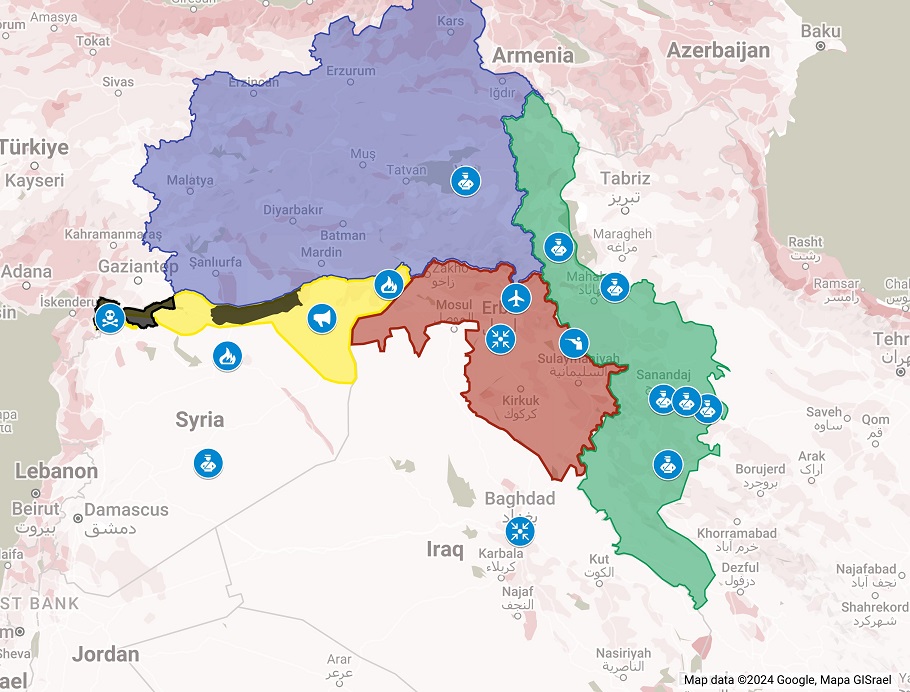1.2K
A weekly brief of events occurred in the Kurdistan regions of Iran, Iraq, Syria, and Turkey.
Iran
- Despite a month passing since the celebration of Newroz in the Kurdish region, authorities persist in arresting organizers. On April 18, the intelligence service (Ettela’at) detained two Kurds from Miandoab of Urmia. Additionally, security forces detained two athletes in Urmia and Dewlan, a 20-year-old in Qorveh, and six civilians in Mehabad and Senna. Concurrently, the Hengaw Organization for Human Rights reported a five-year sentence for Kamal Lotfi by the Islamic Revolutionary Court in Senna for “insulting” the Iranian supreme court and the founder of the regime. The same court also sentenced a woman teaching the Kurdish language to 11 years in prison for her cultural activism. Similarly, a Kurdish man received a three-year and five-month sentence in Piranshahr, while a rapper who addressed poverty in Iran was sentenced to five years in prison. Separately, the regime continued ambushing border porters (kolbar), resulting in the deaths of at least two individuals and injuring several others along the borders in the Kurdish region.
- This week, European Union (EU) countries reached an agreement on the sanctions to be imposed on Iran. These sanctions aim to halt the flow of European products utilized in Iran’s missile and drone industry. Additionally, on Tuesday, the US Treasury Department designated two companies and four individuals for cyber attacks perpetrated on behalf of the Islamic Revolutionary Guards Corps (IRGC) against US companies and government agencies.
Iraq
- Turkey’s President, Recep Tayyip Erdogan, arrived in Baghdad on Monday, engaging in meetings with top state officials, including Iraqi President Latif Rashid and Prime Minister Mohammed Shia al Sudani. During an extensive meeting with Sudani, the two leaders signed a “strategic framework” encompassing security, energy, and economics between their states. Additionally, they signed twenty-five memoranda of understanding covering various issues, along with a water management deal. Erdogan notably welcomed Iraq’s ban on the Kurdistan Workers’ Party (PKK), aligning with Turkey’s plans for a military invasion into the Kurdistan Region. Furthermore, Erdogan participated in a four-way agreement between Qatar, the UAE, Iraq, and Turkey on a “strategic development road project.” Before departing Iraq, Erdogan made a stop in Erbil, where he met with top Kurdish officials to discuss trade and economics. “The discussions also covered the latest developments in the wider region, border security, the fight against terrorism, and other matters of mutual interest,” read a statement by Kurdistan’s presidency. The Turkish delegation, led by Erdogan, included Turkey’s chief of intelligence and minister of foreign affairs. While the topic of resuming Kurdistan’s oil exports was not publicly disclosed, on Tuesday, the Kurdistan Ministry of Natural Resources accused the federal government, particularly the Ministry of Oil, of failing to implement the agreement between Baghdad and Erbil regarding the resumption of oil exports. The federal government is pushing the Kurdistan Regional Government (KRG) to surrender all the contracts of the foreign oil companies against the constitutional rights of Kurdistan.
- An off-duty Peshmerga was killed by a Turkish airstrike near Bradost subdistrict on Friday. The head of the district informed Rudaw that the victim, Sarwar Qadir, a father of three, was inside his truck when the airstrike targeted him. This incident adds to the toll of civilian casualties, with at least two individuals losing their lives in the past ten days. One such casualty occurred in the Mawat subdistrict of Sulaymaniyah, where a Turkish drone targeted a civilian’s home.
Syria
- Amid escalating attacks by ISIS (Da’esh) terrorists in the region, the Kurdish-led Syrian Democratic Forces (SDF) initiated a new security operation in Hasakah’s suburbs on Saturday. According to the SDF, the operation led to the capture of 40 suspects associated with the terrorist organization, including a group responsible for terror attacks in Hasakah. Additionally, weapons and ammunition were confiscated during the operation. On Tuesday, a car bomb struck Raqqa without any known casualties. Terrorist assaults in the Syrian Desert (Badia) have been surging, resulting in the loss of twenty Syrian soldiers just last week. Kurdish officials have issued repeated warnings about the resurgence of Da’esh. In a separate incident, Iranian-backed militias launched several rockets from Iraq towards a US base in Syria. Although no casualties were reported, this attack marks the first since February 6. On a different front, at least seven civilians were arbitrarily arrested by Turkish-backed factions in the occupied Afrin region.
Turkey
- Turkish authorities arrested eight journalists in Istanbul and Ankara who were working for pro-Kurdish outlets. Simultaneously, in Brussels, police raided two Kurdish media outlets, prompting the pro-Kurdish Peoples’ Equality and Democracy Party (Dem) to condemn both governments for suppressing freedom of speech. “It is shameful that Belgium sacrificed human rights, democracy, and freedom of the press in its negotiations with Turkey. Unfortunately, European countries have once again demonstrated that they are willing to compromise on fundamental human values when it suits their interests,” read a statement by the Dem party. On a separate front, the Turkish government imprisoned an 81-year-old Kurdish woman for “aiding terrorism.” The victim, Makbule Özer, suffers from health issues, raising concerns among her family about her well-being.

